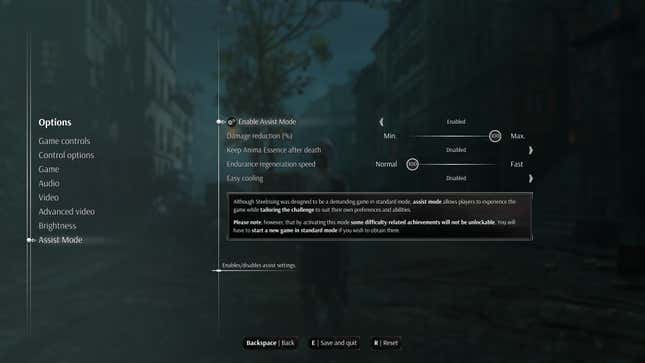
The opening moments of Steelrising felt surprisingly doable and fun for a soulslike, a genre of game that often starts out with tough challenges and a “go figure it out” kinda vibe. But once I hit the second map, I encountered an enemy that made me reach for the game’s “Assist Mode.” You might think that flipping on an “Easy Mode” let me breeze through the rest of the game, mindlessly. But it didn’t. Far from it. The game remains hard, but there was room to learn with more patient pacing. With this mode turned on, the game isn’t constantly sending me back to a spawn area, drained of my experience points with time lost to loading screens. The mode offers variable difficulty options, so I can scale up to where the game wants me to be. Steelrising isn’t dethroning the masters of this genre. But it sure as hell is showing at least one way they can improve, and with a pretty cool aesthetic at that.
Steelrising is the latest title from French developer Spiders. It’s a soulslike where you play as Aegis, a clockwork “automat” who must do battle with other similar creations in a steampunky alternative history twist on the French revolution. The studio is known for narrative-focused RPGs such as 2016’s The Technomancer and 2019’s Greedfall.
Spiders’ previous games, while perhaps being generally similar to something like a Mass Effect, usually march to the beat of their own drum. With Steelrising, I initially wasn’t thrilled about seeing the studio chase the model of another game so closely, only to predictably fall shy of the incredibly strong standard FromSoftware has set in this genre over the years.
If you are a diehard Miayazaki fan who doesn’t have time for imitators, Steelrising isn’t likely to grab your attention. Despite an imaginative premise and some great character design with digestible RPG mechanics, there’s just something missing here. It also struggled to maintain 60 frames-per-second on PC for me, which made the experience feel rougher than it should. Yet, all the boxes have been checked: enemies are tough, you need to level up to meet their health and attack power, when you die you drop your XP, and return back to the last spawn point with all of the enemies having been refreshed, tasked with recovering your don’t-call-’em-souls. You’ll continue to unlock new shortcuts and ways of traversing the winding maps as you move forward. Ya get the picture.
But the “Assist Mode” is where it is worthy of note and conversation.
This mode is a set of options that lets you change a variety of the game’s functions. You can modulate the damage you take, scaling it down to 0% if you desire (you’ll still take fall damage though). You can also choose to keep your XP when you die, adjust your stamina regeneration rate, and affect the “cooling” timer you’ll get when you perform too many actions in a row. If any soulslike is to consider adding difficulty options, Steelrising is a clear model of how to do this.
Those who bristle at the notion of easing the difficulty of a soulslike are likely worried that the core experience risks being diluted or lost, or simply misses the point of the genre. Many might worry that it’s the virtual equivalent of removing guns from a shooter or jumping from a platformer. But Steelrising’s Assist Mode doesn’t pull you away from the core gameplay. Rather, it lets you get a different perspective on it so you can actually get better at the core skills of attacking and dodging and potentially learn how leveling up can change those dynamics.
The option I found the most use of was to reduce the damage to 0%. This meant that the first enemy that truly gave me some troubles, an automat that flings giant steel balls around on chains connected to its arms, could teach me its movesets instead of just beat the shit out of me and forcing me to restart every time I failed. It went from being a giant asshole to a sparring partner.
It still knocked me on my ass every single time. But I could get up and say “okay, when it moves like this, I’ve got to get out of the way.” I learned where the openings were, how quick I should be in pressing my attack. I was able to bake a muscle memory into my response to this kind of enemy, and I didn’t have to go allllll the wayyy back to the damn spawn point and face allll the daaaamn enemiess agaaaaain to learn that. I would love there to be a “fake health bar” so I could get a sense of how much damage they do to know “well, I would’ve died at this point.” Assist Mode helped me understand the language of the game, and has prepared me for when I’m ready to take those training wheels off, take down these foes, and feel accomplished in how I’ve gotten better.

The other difficulty options can also adjust what kind of game this is. Having XP stay with you means death plays a different role in the game. Stamina regeneration can make the game feel a bit quicker. Granted, when you turn on any of these features, there are certain achievements you can’t unlock. But that’s fine! In fact, it really does preserve the crushing difficulty the devs were aiming for. It makes playing the game the way it was designed as something you could aspire to, not be punished so often for failing to meet its demands.
I enjoy challenges and difficult experiences in video games and elsewhere. I like to see my own improvement in the things I find interest in. But soulslikes have, far too often, been too punishing of a teacher for me. And as someone who struggles with my mental health and has to fight off enough real demons when something is frustrating, soulslikes have remained something that feels too unkind to me. I’m just less likely to engage with them. I want to experience the thrill of beating these games, the accomplishment of having mastered something. I just need to prioritize my personal cooldown timer for things in life that will never have a difficulty slider. Steelrising proves that a game can do this while still being quite hard.
“Assist Mode” didn’t simply make the game easier. It was a helping hand that reframed the frenetic action to say, “hey, you can actually do this. And here’s how.” Games need more of this.